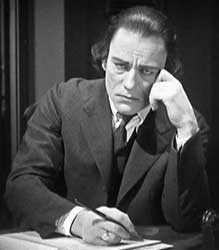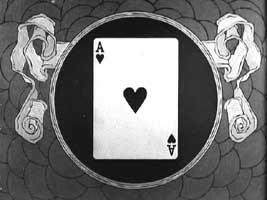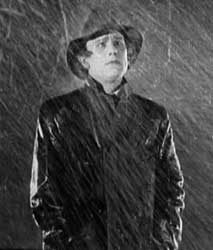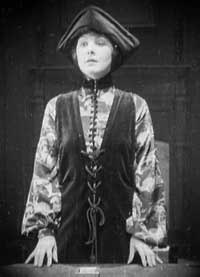 Based on a short story by San Francisco novelist & magazinist Gouverneur Morris, The Ace of Hearts (1921) is a silent film of intrigue & emotion, starring the great Lon Chaney.
Based on a short story by San Francisco novelist & magazinist Gouverneur Morris, The Ace of Hearts (1921) is a silent film of intrigue & emotion, starring the great Lon Chaney.
Gaining access to the room by a secret knock, a mysterious meeting is in progress. Last to arrive is Farallone (Chaney), though there is one empty chair indicating a missing ninth person. The eight men begin the proceedings without the presence of their "sister" Lilith (Leatrice Joy).
Their secret society has come together to discuss the fate of "a certain man" (Raymond Hatton) who had been empowered to help the world, but who has undertaken instead to further his "unscrupulous ambition on a colossal scale." Morgridge (Hardee Kirklandas) is of the opinion that the man's death would benefit mankind. Forrest (John Bowers) is inclined to respect Morgridge's assessment.
One after another "Death!" is the judgement everyone around the table, including that of Farallone, a portraint painter who has been in the judged man's company for three months doing his portrait, & has arrived at the opinion: "He has lived a thousand times too long! Death!"
"Do you all vote death at our hands?" asks Morgridge, & it is unanimous. Later that night they will convene again to ritually decide to whom the ultimate deed will be assigned.
Forrest & Farallone visit Lilith to inform her of the society's decision, with the warning that any one of them, including herself, could end up selected to do the deed. She says, "Does it matter who is chosen, if the work is well done?" She is as willing to give her life to their cause as anyone.
Forrest declares his love to Lilith, but she can think only of the Cause. Farallone, too, loves her, but knows Forrest as the younger & more handsome man is held higher in Lilith's esteem, despite her protestations of caring nothing for love.
That night the ritual is undertaken. Who receives the Ace of Hearts, as Lilith passes out cards, will be the assassin. He (or she) will be provided with a bomb that will be set off at the place where "the man who has lived too long" breakfasts. The barer of that bomb may well be blown up too, if his or her timing is bad. Innocent people will inevitably be killed, but it can't be helped.
What we have here is perhaps the first film ever to select suicide bombers as heroic protagonists!
 Lilith shuffles & deals the deck. The process is suspenseful & interestingly photographed. Forrest exults with bizarre delight when the fated Ace falls to him.Others at the table are glad not to have been chosen by fate, except Farallone, who is so quietly despairing that he most would've welcomed being blown to smithereens. Lilith shuffles & deals the deck. The process is suspenseful & interestingly photographed. Forrest exults with bizarre delight when the fated Ace falls to him.Others at the table are glad not to have been chosen by fate, except Farallone, who is so quietly despairing that he most would've welcomed being blown to smithereens.
For Lilith, Forrest & the Cause have now become One, & after all she does love him. She will marry him that night in case there is never again an opportunity to wed, though she might be a widow the following day. Farallone's natural woefulness, now that he has definitively lost at love, becomes a deepening suicidal misery.
Lilith & Forrest have a quicky-wedding that same night, though it must be at least midnight & this isn't Vegas for crine out loud. They go home together for what could turn out to be their one & only opportunity for nuptials.
A ferocious storm rises & Farallone stands outside the newlyweds' apartment like a crazy stalker blasted by gales & hard fall.
At dawn the happy couple wavers in intent, & would prefer their blissful night together not be the only one. "Hatred seems so wrong -- now that we have love," notes Forrest, & Lilith falls into his arms.
Throughout this tale we have to take the word of these conspirators that the "certain man" deserves to die. We are given no substantive reason to agree or disagree with them.
The sun dries out the streets. Outside on the apartment's steps sits Farallon, who is all but humped by an exceedingly friendly dog. He takes the dog in his arms & places his face upon its muzzle & hugs & hugs the stray as though it were his lover. Here is the man who would welcome death; upstairs are a man & woman who suddenly wish for life.
 The naturally spooky vintage cinematography has great appeal, & Chaney has a charismatic presence always astonishing. This time he is as pallid a downcast man as can be imagined, who seems weighted down by burdens. The naturally spooky vintage cinematography has great appeal, & Chaney has a charismatic presence always astonishing. This time he is as pallid a downcast man as can be imagined, who seems weighted down by burdens.
The story itself is rather simpleminded if not a little foolish, but every time the camera turns to Chaney, there's such a world-weary misery upon his gaze that the film rises in strength.
I felt a strong fascination with the period morality, as the story never really questions the heroic quality of a terrorist organization existing to assassinate whoever they decide is "bad." The idea of extra-legal avengers as heroic is forever with us (in the Mission Impossible television series & films, for instance). But could today's idle entertainments as easily make heroes of suicide bombers?
The tale never questions but that killing bad people can be a good thing. What it does ultimately question is whether it can ever be acceptible to sacrifice innocent people. The bomb set to go off in the restaurant must inevitably kill innocent people, but if your newly in love Forrest refuses to kill the innocent to kill the bad, he will be assassinated by his own secret society. This appears to be the only part that the story disapproves.
This was closer to a time in history when "terrorists" were Russian revolutionaries approved of in the west, rather than Moslems the west deplores, so the ambiguity regarding suicide bombers is of its time. Which indicates that our culture has darned few moral absolutes, but only moral fashions!
When Farallon stood outside the newlywed's apartment in the storm, Forrest warm within said to his new bride, "The violence of the storm will rid the world of filth & rubbish." It was the film's only acknowledgement that what constitutes rubbish is entirely subjective. And in the end, it is Farallon who will be the storm.
Lilith pursues Farallon to do something that will save Forrest. She feels in her heart he will not be able to kill anyone, now that he has known a great love, & it is the terrorist cell's response that she most fears. The choice Farallone ultmately makes is perhaps too obvious from the start, but effective just the same. It's amazing how hard-hitting a thriller from the silent era can remain across the decades.
copyright © by Paghat the Ratgirl
|

